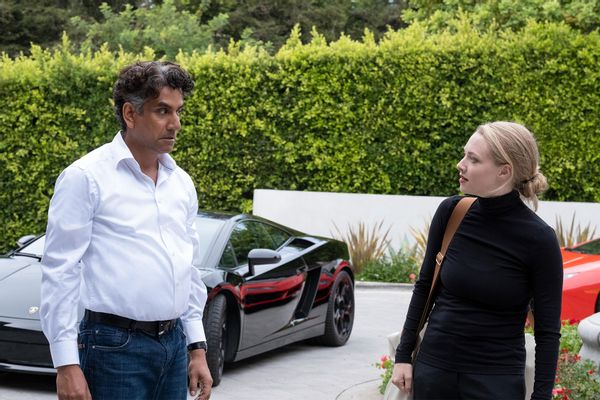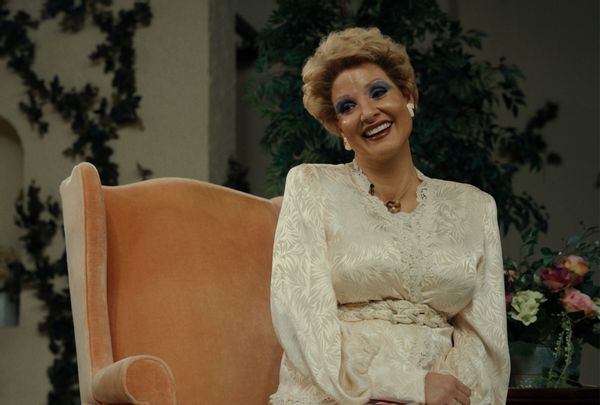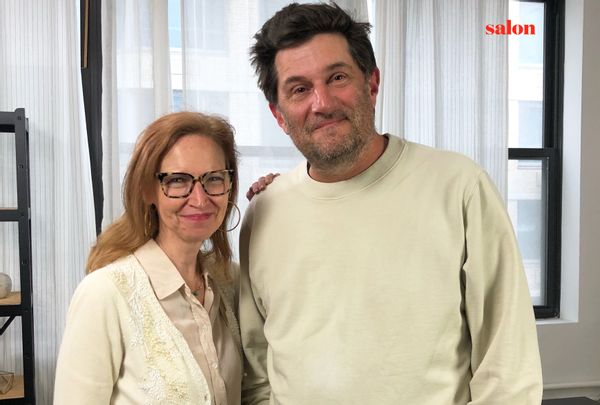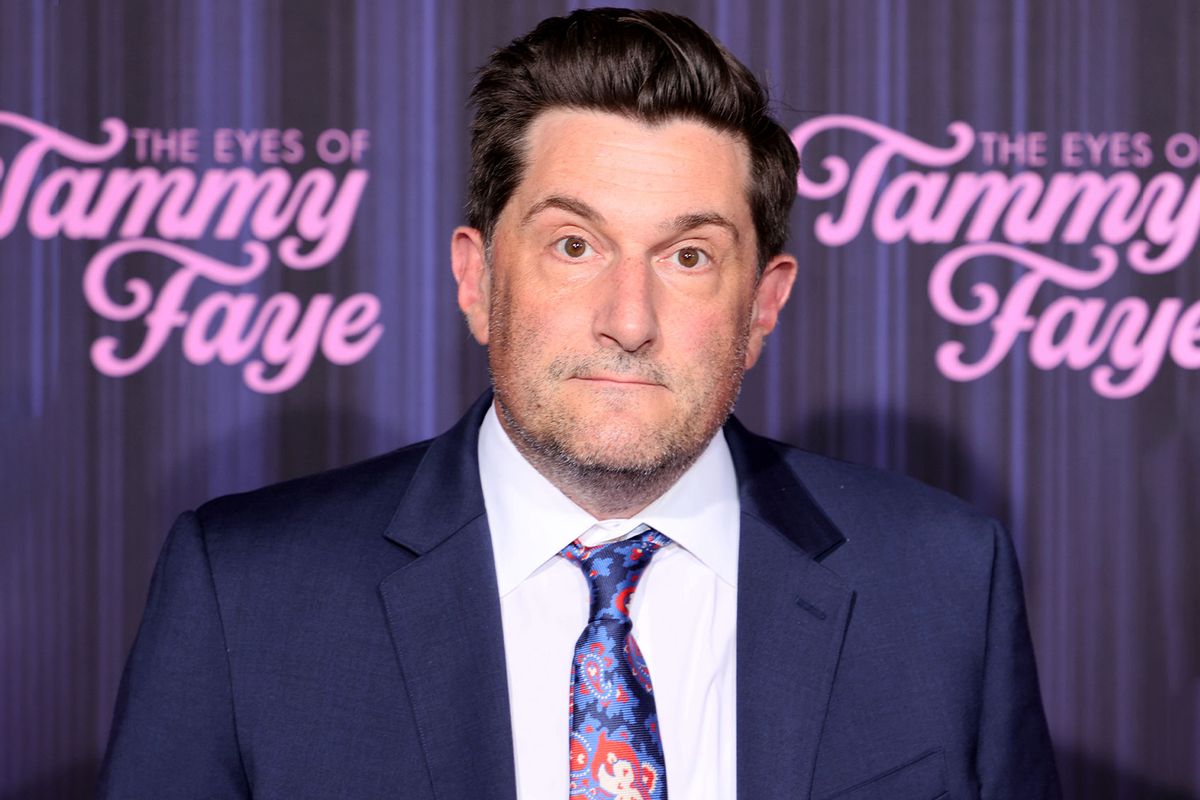Michael Showalter is having a career-defining moment. The writer, director, actor and producer has been gaining a steady following in the entertainment industry for nearly 30 years, thanks to the beloved MTV sketch comedy show "The State" and the cult classic "Wet Hot American Summer." But more recently, he's carved a reputation as one of the surest hands with stories that skate the line of drama and comedy — especially if they happen to be true. After directing "The Big Sick," in the past year, he's directed "The Eyes of Tammy Faye," and has been a director on "The Shrink Next Door" and "The Dropout."
Showalter, whose upcoming projects include the adaptation of Michael Ausiello's memoir "Spoiler Alert: The Hero Dies," stopped by to appear on "Salon Talks" recently to talk to me about why we're fascinated with the cult of personality, and the true Hollywood story he'd still like to get his hands on.
This conversation has been lightly edited and condensed for clarity.
Most of us remember you from your beginnings in the world of comedy. Over the last few years, your career's taken a different direction. You've gone more dramatic and dark. It feels like to me "Hello, My Name Is Doris" is a turning point in your career. Talk to me about what's changed and how you've evolved as a storyteller.
As a consumer of television or movies or theater, or even podcasts or books, I gravitate more towards those kinds of subjects. It became this thing of wanting to work on the kind of projects that I, as a viewer, like. I obviously love the comedic work that I've done. I grew up loving "Airplane!" movies and Woody Allen comedies and what have you, and really loved that part of my life. But as I got a little older, my interest did start to diversify. It became a question of, how can I do that? This industry likes to label you, and likes to keep you where you are. Which isn't criticism, it just is how it is. So, that was both as an actor, wanting to feel like I could be seen as not just an actor, but also as a writer and a director or a producer.
RELATED: Cassandra Freeman on why she feared playing Will Smith's Aunt Viv in "Bel-Air" reboot
It really was "Doris" that changed that. I was living in New York, teaching screenwriting at NYU Graduate Film School. I was helping my students work on their own scripts, giving them advice that I wasn't necessarily taking myself, about how to push characters further and to go deeper into character. In a sense, it gave me a little bit of a boost, and some courage to take those risks with my own work and my own writing. That's what "Hello, My Name Is Doris" really is, that first big experience where I was trying something that was really funny, but there are some really heartbreaking dramatic scenes.
Working with Sally Field was instrumental in helping me, pushing me and really encouraging me in that direction, giving me a sense of some confidence about that. People really responded to that film, and then "The Big Sick" happened. All of a sudden, there I was doing the kind of the work that I've been wanting to do.
Sally Field, who you're working with again now in a new film, was known as a very lighthearted figure, was not necessarily thought of as a very "serious" performer. And then obviously had that exact same shift.
I definitely think there was simpatico about that. When you work with her, get to know her a little bit, that drive to prove herself is always there. Part of her felt that way that I feel, which is wanting to feel like you're more than just something you did a long time ago. Jim Parsons, who I'm doing this movie with now, said something similar to that. He's obviously really well known for his incredible work that he's done in television, but really wants to show other sides of himself. And I like supporting people, I like working with people like that. Whether it's Jim, or Kumail in "The Big Sick," where he was the leading man, and the romantic leading man. Even Jessica Chastain. You see her as this very serious actress, but I feel like there are sides to Jessica that she really got to show in "Tammy Faye."
I gravitate towards people that are looking to step outside their box, even Amanda Seyfried in "The Dropout." I'm really interested in working with people who I get this sense of, there's something more there that they have to show the world. I love being a part of that.
Throughout the projects you've done, the actors who have starred in them have often come from the world of comedy, whether it's Will Ferrell, Louie Anderson, Kathy Griffin, Stephen Fry. You have these comedy heavyweights doing pretty dark material. What do you think that people who come from that comedy background bring to that darkness?
I feel like comedians, or at least the kind of comedians that I got to know and work with, it goes without saying, aren't the happiest people in the world. Everyone has pain, and comedians use comedy to process that, or communicate that.
I've noticed over the years that comedians, just like musicians, or just like anybody, have a shared language. There's a way that comedians communicate with each other that is usually through the lens of comedy. There's riffing, doing bits, that kind of thing. Comedians often can't help but be funny, they can't help but bring humor to what they're doing. I'm a little bit like that, in that even when I'm working with dramatic material, I tend to find ways to find humor in it, even if it's not on the page.
I think comedians are like that too. They inherently find something funny in what they're doing, that's not necessarily about telling a joke or yukking it up or trying even for a laugh. There's just some sense of levity or humor that made me speak to some way in which comedians see the world. There's a way of seeing the absurdity of all of this folly of life. I like that. I like the lightness that a comedian may bring to something that is inherently dark.
When I am watching "The Dropout," and I think of some of your earlier work like "Wet Hot American Summer," I see the farce. I see the physicality in it, just the absolute hijinks of it. Things are going on in the background while something very serious is happening in the foreground. It feels very much like you couldn't do that without that comedy element.
For me, it's also it's theater. What I really love and I feel like I've connected with the most is theater. Think of even something like "Angels in America," which is a hilariously funny play. Most of my favorite plays, the first two-thirds are really funny, no matter how heartbreaking it gets and then how heavy the themes are and how dark the material is. A lot of really great plays are funny for a while, before they get serious. That's a little bit of the formula that I've gravitated towards.
You have fun for a little a while and you have humor. And then things tend to go there, in the last third. There are many great examples of that in both film and theater. For me, the way I love going to see a play, is that experience of you laugh and laugh and laugh, and then at the very end, all of a sudden it hits you, what it's all about.
 Naveen Andrews as Sunny Balwani and Amanda Seyfried as Elizabeth Holmes in "The Dropout" (Beth Dubber/Hulu)
Naveen Andrews as Sunny Balwani and Amanda Seyfried as Elizabeth Holmes in "The Dropout" (Beth Dubber/Hulu)
That's what really stings. You've done a lot of work that is based on true stories. I'm thinking particularly of "The Dropout," because it's a story many of us became obsessed with. I want to know what drew to this particularly, and what surprised you going along into investigating it.
What drew me to it, was just what you said. I'm fascinated by this story, really fascinated by Elizabeth Holmes as a protagonist. She's an incredibly unique and enigmatic character, in that she's not as easy to define in terms of her motivations as say, Bernie Madoff, who seems to have just been really greedy. I shouldn't speak out of turn, I don't know a whole lot about him. But there's something very ambiguous about Elizabeth Holmes in terms of the why. The enormity of the deception, the people who are involved, what it says about our culture that someone like that is able to succeed to that extent. These are all things that really interest me, like the cult of personality. Our predilection towards investing in false idols feels very uniquely American.
Those were all things that really drew me to it. Then when I read the scripts, I was so excited because Liz Meriwether wrote such fantastic scripts. In terms of what I learned, I think seeing Amanda's performance. A lot of times, what I get excited about directorially is, I just want to be in that world. I'm excited to live within that reality.
When I'm there on set, I'm really excited to be in those offices. It's all very like play time, it's very make-believe. What would it be like to have been in the Theranos offices when all this was happening? Let's try to recreate that and let's see what we find out. I credit Liz and her writing staff with this, because they found a narrative about what might have been that motivation, that I think for all of us who have been on the outside looking in, haven't. I haven't anyway, really been able to pinpoint what that is.
It's some trauma, it's some garden variety naivete, and a kind of pluckiness that we all can, I think, identify with. That "fake it until you make it" thing that we've all done. How many times has someone said, "Hey, how's that script coming?" I'm like, "It's great. It's great," and I haven't even started it yet. Her love story between her and Sunny. I felt like we really started to understand. For Sunny anyway, it seems he was just in love with her, and was willing to do anything for her, which is so old-fashioned, Shakespearean kind of thing.
And then Amanda's performance. She found this deeply conflicted, extremely driven character who was coming to crossroads over and over again, and seemingly always making the wrong choice. It's not clear, again. What's hard for a lot of people to understand is that it doesn't seem like she was motivated by a monetary greed. Maybe power. I don't know.
I'm thinking of Tammy Faye and Elizabeth. Such different people, such different personalities, such different motivations. And yet they both created these personas that they hid behind. It was the eyes, it was the black turtlenecks. I'm wondering about how you, as someone who has performing experience, has writing experience, were you thinking about that going into these projects. These are real people who created characters.
No, but I should have. I love that and yes, you're so right and I never thought about it. I think what I'm drawn to in both cases initially is the phenomenon of the cult of personality. What sucks me in is the way in which, in the case of Tammy Faye, the way in which people create a persona that then other people follow.
That's what fascinates me. It gets to questions about truth and authenticity, that are really interesting to me. Like a quest for authenticity — what is authentic? The way in which the truth has lost value, which is very upsetting to me. I don't want to think about it, so I like to just talk about it in the abstract. We really are screwed, if there's no such thing as truth, and it feels like in both of those cases, and with "The Shrink Next Door," if you want to include that, there's a kind of gaslighting that happens in all of these stories, that I think is terrifying. So I'm drawn, but, weirdly, it's an attraction-revulsion thing. I can't take my eyes off it, but it's terrifying. That's what it is for me, that manipulation of the truth.
 Jessica Chastain as "Tammy Faye Bakker" in the film "The Eyes Of Tammy Faye" (Photo Courtesy of Searchlight Pictures/20th Century Studios)
Jessica Chastain as "Tammy Faye Bakker" in the film "The Eyes Of Tammy Faye" (Photo Courtesy of Searchlight Pictures/20th Century Studios)
You are part of this zeitgeist that will be remembered as a cultural moment, where we were collectively obsessed with those phenomena. With Tammy Faye, and with Elizabeth, and with Anna Delvey, with WeWork.
For me, it is to the other. It's to He Who Shall not be Named. That's what it is for me. What it really goes to is, He Who Shall not be Named in our country. And us, as a people. I know that there is this trend of the Anna Delveys, but all those Anna Delveys and Liz Holmeses and WeWorks, they're all stand-ins for He Who Shall Not be Named, and for this whole country, that's still in thrall to this two-bit con artist. In a lot of cases, that's what they are too, when you step back from it and you go, there's no paradigm. There's literally nothing there.
Five years later, we're now looking at it through this different prism of con artists.
Con artist, but I would like to it to be about us, more than that. What's so interesting about Liz Holmes is, Mattis and Kissinger and the Stanford professor that got it all started. These powerful, successful, well-educated people who she had wrapped around her finger. The con artists are a dime a dozen. They're going to keep coming. It's us who keep falling for it. I do think this is an American problem. At least that's how I want to look at it. Why do we keep wanting to buy into this?
It's all about the personality. It's not about the data. It's not about the proof. I have it in my own life too. We all have people in our own lives that we go, "How did that happen? How did I let myself get so manipulated by that person?" It's traumatic. I like to try to work through some of that by talking about it around another story. Everyone has, and everybody can relate to, "There was someone in my life who . . . " Everybody has that story of that person that seemed to have a little bit of mind control over them. And how did I let that happen?
You've done so much in the realm of stories that are about real people. You have another one coming out based on a real person and a real story. Is there a figure either historical or contemporary that you think, "I would love to get my hands on their story"?
This is what jumps to mind, only because it's a story I've wanted to tell, but it's not really the right answer. It's about the making of "Heaven's Gate," which was the first blockbuster flop. There's this brilliant book called "Final Cut." I would love to tell that story. It too has a very central theme about a cult of personality. That cult of personality was the concept of the auteur filmmaker, and the way in which in that moment, the auteur filmmaker became a tyrannical presence and ends up hijacking the entire studio. And ultimately that studio is no longe. It's an incredible story.
At the root of it is, to me, a question about art and filmmaking and the corporate side of it, and the end of the studio era and stuff like that. There is a central theme there about Michael Cimino, the director, and the way in which they all believed him to be the next Orson Welles, or for instance, Francis Ford Coppola, and whether purposefully or not, how he abused [that belief]. That's how I see the story.
But let's say, both Orson Welles and Coppola also abused.
They did, and that's the thing about Elizabeth Holmes. She really wasn't doing anything any different than what all those other guys have done. It's just that they got lucky. I guess the clock didn't run out for them. Unfortunately, the clock ran out for Elizabeth.
 Mary Elizabeth Williams (left) and Michael Showalter (right) at Salon in New York. (Salon)
Mary Elizabeth Williams (left) and Michael Showalter (right) at Salon in New York. (Salon)
More of our favorite Salon Talks:



Shares